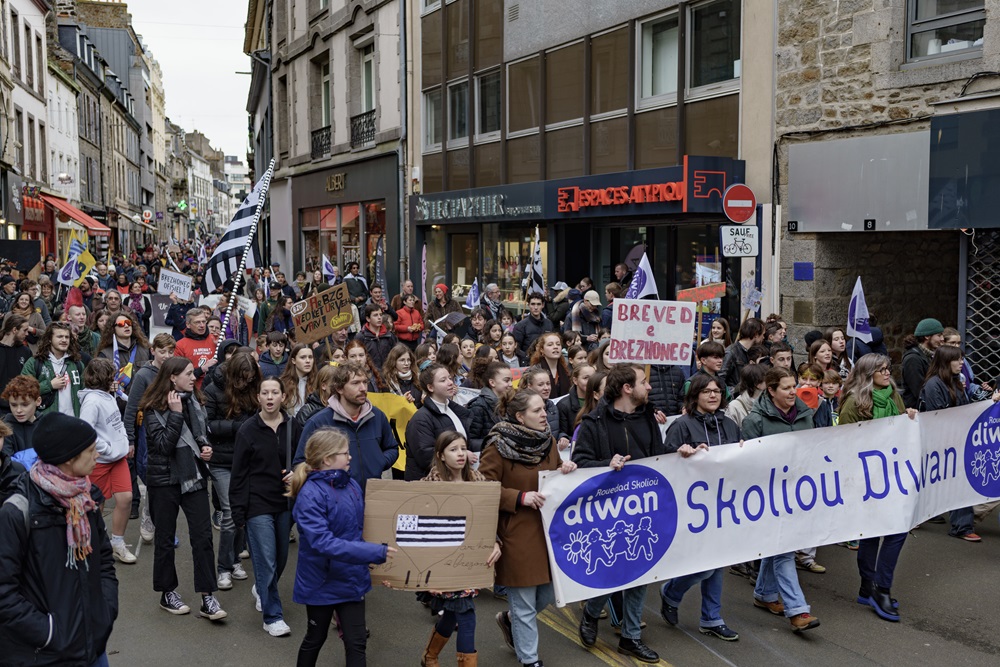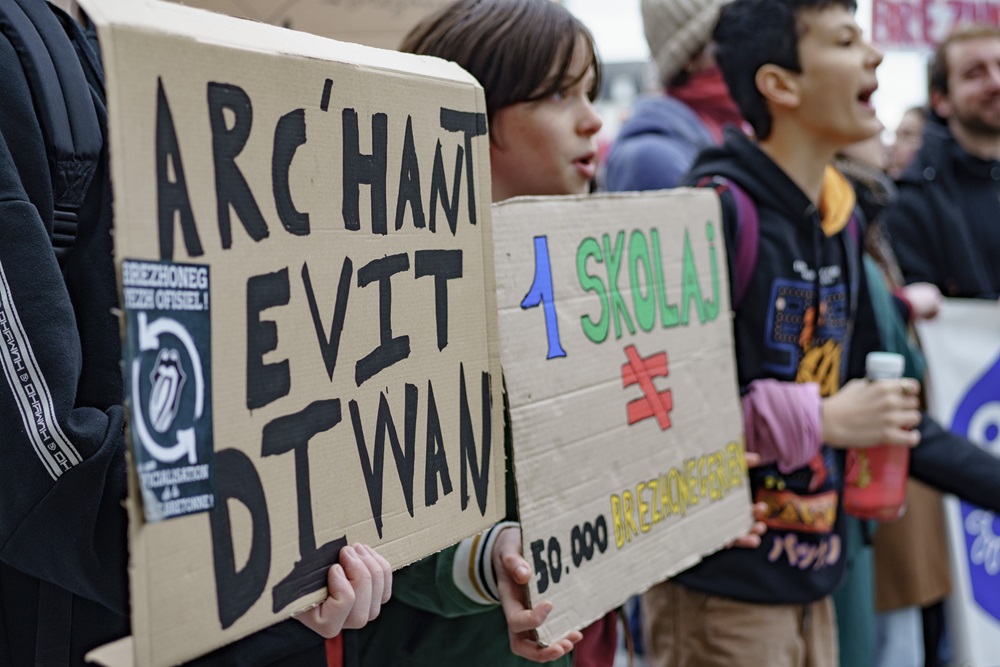Cash crisis threatens Breton-language schools

Luke James
Ffran May used to bring Breton children on a school trip to Wales every two years.
Originally from Haverfordwest, May moved to Brittany shortly after graduating from Aberystwyth University and has been working there as a teacher for the past 34 years.
“We used to come to Pembrokeshire but we can’t afford that anymore,” she told Nation.Cymru.
Despite having enjoyed the chance to lead her classes on an inter-Celtic cultural exchange, cancelled school trips are the least of May’s problems as a teacher in the ‘Diwan’ network of Breton-language immersion schools.
May has been teaching in a temporary classroom since last October when a storm badly damaged the roof of her school.
‘Shoestring’
And now Diwan has begun the new school year by announcing it needs to fill a half a million Euro hole in its budget just to keep the doors of its 55 schools open to 4,000 students until the end of 2024.
“We’re working from old workshops which used to be used for welding and things,” she said.
“That’s obviously very difficult in itself.”
“We do really well but we teach on a shoestring. We have very little money to buy books. My colleagues don’t know if they will be paid from month to month.
“Parents have to work really hard to get the money to subsidise any school trip we do. We get by. There are ways and means to everything, but it’s a massive psychological strain.”
The current financial crisis has been sparked by inflation, which has seen Diwan’s energy and staffing costs rise while its funding has remained the same.
But the root problem is the fact the schools are considered private and are not fully state-funded despite not charging fees.
Diwan’s public funding, which comes largely from local authorities, made up 51% of its 6 million Euro budget in 2019, but now covers only 46% of its costs.
Public funds
The network does not receive any public funds in the ‘Loire-Atlantique’ department, which is historically part of Brittany but not currently part of the administrative ‘region’, despite educating more than a third of children being schooled in Breton in the area.
Diwan supported a demonstration which took place in Nantes yesterday in favour of the reunification of Brittany.
“We are lumped with the private schools, but we are very much free, non-religious, and we think we provide a public service by raising fully bilingual kids,” said Riwanon Pollock, a parent of two children attending Diwan schools.
“The teaching methods are a little bit different – a bit more child centred I would say. My children have had a fantastic experience at school. There’s not a lot of money. The material conditions are not the most up to date. But they have lots of fun.
“We were always just about OK, but inflation has pushed us over the edge.”

In 2021, the French parliament passed a bill brought forward by independent Breton MP Paul Molac designed to officially recognise and boost funding for schools teachers through ‘regional languages’, such as Breton, Basque, Catalan and Occitan.
Supporters celebrated by leading a rendition of the Breton national anthem, which shares the tune and lyrics of Hen Wlad Fy Nhadau, on the steps of the parliament.
However, just weeks later, key parts of the legislation were struck down by French judges, who deemed it unconstitutional in a state where French is the only official language.
It means Diwan schools still exist in a legal grey area.
“This is the third time we’ve fallen into insolvency since I’ve been teaching here,” added 55-year old May.
“The reason is that the Breton language isn’t officially recognised. There is no obligation for the state to help. There’s no law to reinforce basic human rights to education in your language.
“Unless France changes its basic laws and understands that a republic is not one language and one culture, it’s going to be the same from generation to generation.
“I’m now teaching kids of pupils I had and nothing has changed. In fact, it’s getting more difficult.”
Molac is among 20 Breton MPs who have written to French President Emmanuel Macron to seek support over the “severe financial problems which could put the [Diwan] network in peril by the end of October.”
Cut costs
Diwan has tried to cut costs, including by recently cancelling a catering contract and asking children who board overnight to bring their own breakfast.
But Pollock, who is also a board member of the network, says there is “zero fat we could cut.”
“We are operating on a shoestring,” she said. “We are so, so, so underfunded. There’s literally nothing we could cut. That’s not even an exaggeration.
“We have to find our own buildings. A lot of the buildings are buildings that no one else wants.”
School leaders are now focusing on trying to raise funds from former students, supporters of Breton culture and local business benefiting from the launch of the first vocational training in Breton.
If the target is met, the network hopes to open four new schools across Brittany in the near future.
If not, teachers, parents and the Breton language face an uncertain future.
“The consequences would be that we would not be able to pay our staff,” added Pollock.
“I personally think it’s just unfathomable that Diwans could stop.
“We’re around since 1977. We’ve seen plenty of challenges and we’re convinced we’re going to survive this one. But it’s scary.”
Read more: Students in Brittany win right to sit science exams in Breton language
More information about the Diwan fundraising campaign can be found here.
Support our Nation today
For the price of a cup of coffee a month you can help us create an independent, not-for-profit, national news service for the people of Wales, by the people of Wales.







Every language is a minority language Jack for no language on earth is first language to anywhere near half the world’s population. If you mean lesser used languages are unimportant I would suggest that this is a pretty uncivilized point of view. However, it is a viewpoint that has been held by aggressive colonialist countries upon their victim countries for centuries. It has resulted in extreme linguistic repression being perpetrated on many countries with a view to destroying their languages. Wales, Scotland and Ireland come to mind and France are still at it.
Same old attitude. They won’t be happy until all our beautiful languages and means of communication are eradicated and diversity stamped out in favour of a sterile monoculture, which is actually devoid of any meaningful culture. So what then? Once cultures have been erased, who to pick on next? Does the monoculture then consume itself in its voracious appetite to keep on destroying? Self-defeating and myopic. If we make the comparison to our environment, nobody needs to be told how important biodiversity is to an ecosystem or genetic variation to the survival of a species. What possible threat to the… Read more »
There’s been several times I’ve heard supporters of the Welsh language use France as an example of a country standing up for it’s language, the irony is never lost on me. France has been a brutal suppressor of minority languages and identity. Only recently has that started to change.